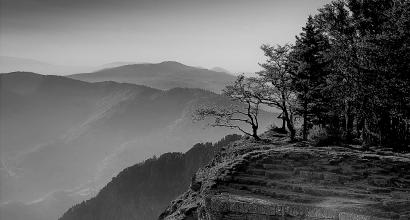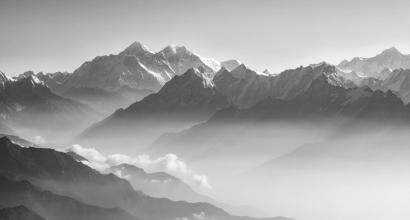(Karmayoga)
yajñārthāt karmaṇo ’nyatra loko’yaṃ ।
karma-bandhana iti jānīhi satyam ॥
karma-phalāsaṅgaṃ tyaktvaiva santṛptaḥ ।
karma kurvannapi kartā sa naiva ॥ 13 ॥
Know the truth, that karma is shackling
Unless performed as yajña for the world’s well-being.
One who is satisfied, and gives up the desire for the fruit of karma
Even when he is engaged in it, he is never the kartā.
yaḥ kāma-krodhod-bhavaṃ vegaṃ sahate sa ।
ṃukto vimuktaśca saṃsāra-bandhanāt ॥
yo māṃ paśyati sarvatra sarvaṃ ca ।
mayyeva tasyāhaṃ mama sa ca mitraṃ ॥ 14 ॥
One who can endure the agitation of kāma and krodha
Is completely free of the fetters of saṃsāra.
One who sees me everywhere, and everything in me,
I belong to him, he is my ally.(Surrender)
mayi sarvamidaṃ protaṃ sūtre maṇaya iva ।
jaṅgamājaṅgamaṃ jagadapi pārtha ॥
bahu-janmanām ante jñānī māṃ bharaṇaṃ ।
vāsudevas-sarvam-iti yāti śaraṇam ॥ 15 ॥
Pārtha, the universe, moving and unmoving
Is all strung within me, like beads on a string.
The jñāni seeks refuge in me, the supporting being,
At the end of many lives, and realizes that Vāsudeva is everything.
antakāle ca māmeva smaran-muktvā ।
yo’ṅgaṃ prayāti sa madbhāvaṃ yāti ॥
yaṃ yaṃ vāpi smaran bhāvaṃ tyajatyante ।
dehaṃ tamevaiti kaunteya satyam ॥ 16 ॥
One who remembers only me at the end,
And leaves his body, attains my state.
Whatever state is meditated upon at the end,
is attained, Kaunteya, know this to be the truth.
māṃ prāpya punarjanma duḥkhālayaṃ lokaṃ ।
na prāpnuvanti parāṃ siddhim āptāḥ ॥
ṣañcintayanto māṃ ye paryupāsate ।
teṣāṃ yogakṣemaṃ vahāmyaham-eva ॥ 17 ॥
Those who have attained me are not born again,
In this world, the abode of sadness.
Those who worship me, think of me alone
I will myself take care of their welfare.
api cet-sudurācāro bhajati cen-māmeva ।
dharmātmā sa bhavati śāntim-upaiti ॥
śritvā māṃ strī-vaiśya-śūdrāśca mucyante ।
bhaja māmasmin loke asukhe anitye ॥ 18 ॥
Even if one is evil, but worships me with single mind,
He becomes dhārmika, and attains peace.
Taking refuge in me, women, vaiśyas and śudras are liberated.
Attain me here in this world which is ephemeral and sad.
Na tadasti madvyatiriktaṃ carācaraṃ ।
matkarma-kṛn-madbhakto nissaṅgo ॥
nirvairas-sarva-bhūteṣvapi yassa mā -।
meti pāṇḍava pārtha jñāta-śāstrārtha ॥ 19 ॥
There is nothing apart from me, moving or unmoving
Doing my work, my devotee becomes free of attachment.
The one who is friendly with all beings,
Attains me, O Arjuna, Knower of śāstra-principles!
Ye tu sarvāṇi karmāṇyapi mayyeva ।
saṃnyasya māmeva samupāsate ye ॥
teṣām-ahaṃ samuddhartā saṃsārato ।
na cirāt pārtha bhavāmi jahi śatru-sārthān ॥ 20 ॥
I quickly become the deliverer from saṃsāra, of
Those who perform all karmas and offer them to me,
And those who worship me alone.
O Pārtha, do destroy the troops of enemies.(Characteristics of a bhakta)
nirmānitvam-adambhitvam-ahiṃsā kṣāntiś-ca ।
ārjavam-ācāryo-pāsanaṃ śaucam ॥
sthairyam-ātma-vinigraho viṣayeṣu ca ।
vairāgyam-iti mama bhakti-svarūpam ॥ 21 ॥
Unpretentiousness, non-violence, and humility
Sincerity, devotion to Guru, and purity,
Steadfastness, self-control regarding sense objects,
And vairāgya are the marks of devotion to me.
anahaṅkāro janma-mṛtyu-jarā-vyādhi- ।
duḥkha-doṣānu-darśanam-asaktiś-ca ॥
anabhiṣvaṅgaḥ putra-dāra-gṛhādiṣu ।
iṣṭā-niṣṭā-ptiṣu samacittatvaṃ ca ॥ 22 ॥
Absence of pride, understanding the defects,
Of birth, death, old age, disease and feebleness,
Absence of infatuation towards children, wives and houses,
Equanimity towards desired and undesired outcomes.
mayyeva bhaktir-vivikta-sevitvaṃ ca ।
aratir-janānāṃ ca saṃsadi nityaṃ ॥
adhyātma-jñāna-nityatvaṃ ca kaunteya ।
tattva-jñānārtha-darśanam-iti nityam ॥ 23 ॥
Devotion only in me, serving in solitude,
Constant unattachment to people’s assemblies,
The eternality of spiritual knowledge, O Kaunteya,
Is forever the grand sight of true knowledge.
yo’vyabhicāreṇa bhakti-yogena māṃ ।
Sevate sa guṇān tāns-trīn-apy-atītya ॥
brahma bhūyaṃ ca tad-añcati mad-bhakto ।
mayi bhaktir-evaikā bhava-sindhor-naukā ॥ 24 ॥
One who worships me with single-minded devotion
Transcends all the three guṇas.
Thus, my devotee attains the state of Brahma
Devotion towards me is the only ship to cross the world-ocean.
tameva cādyaṃ puruṣaṃ prapadye
yasmāt-pravṛttis-tu prasṛtā purāṇī ।
evaṃ prapattyā tu śaraṇaṃ bhajan sa māṃ
jagan-mūla-kandaṃ yāti mukundaṃ ॥ 25 ॥
One who devotedly seeks me thinking thus -
“I seek refuge in the unparalleled puruṣa
From whom all events of yore manifested”.
Attains me, Mukunda, the origin of the universe.
kāma-krodha-lobhākhyāś-śatrava ete
dussaha naraka nipātana-dakṣāḥ ।
tasmād-etat-trayaṃ saṃtyajya kaunteya
śāntastu tāṃ gatiṃ yāti parāṃ ca ॥ 26 ॥
Kāma, krodha and lobha are your enemies,
capable of felling you into intolerable Naraka.
Giving up these three, O Kaunteya.
One who is serene attains the state most exalted.
aśraddhayā hutaṃ dattaṃ tapas-taptaṃ
yat-kṛtaṃ tatsarvam asad-iti viddhi ।
na ca tat-pretyāto no iha kaunteya
śraddhā-puras-saraṃ sad-avehi sarvam ॥ 27 ॥
Understand, that āhuti, dāna and tapas
Done without śraddhā, are infelicitous.
It yields neither worldly nor other-worldly benefits.
Know that whatever is done with śraddhā is the best.
satyaṃ te prati-jāne pārtha priyo’si me
sarva-dharmān pari-tyajya mām-ekaṃ ।
śaraṇaṃ vrajāhaṃ te sarva-pāpebhyo
mokṣayiṣyāmy-eva mā śuca ittham ॥ 28 ॥
Pārtha, I tell you the truth; you are dear to me.
Give up all dharmas and seek refuge in me.
I will surely rid you of your pāpas; do not despair thus.
(Pray to him who spoke to Arjuna thus).(Śrī-Kṛṣṇārpaṇam)
vasudeva-suta kṛṣṇa jagatāṃ guro kṛṣṇa
śaraṇaṃ ramā-jāne tvāmeva jāne ।
rādhā-ramaṇa nārāyaṇa govinda
khelaya māṃ tvayi pālaya ceti ॥ 29 ॥
O guru of the universe, O Kṛṣṇa, O son of Vasudeva,
I seek your shelter. I know only you, O beloved of Ramā.
O Nārāyaṇa, Govinda, beloved of Radhā,
Make me sport in you, and protect me.
kāyādi-viracitam akhilam api ca karma
kṛṣṇe’stu parihṛta-saṃsāra-tṛṣṇe ।
veṅkaṭa-giri-vāse pālita-nija-dāse
śubhalakṣmī-suvilāse śrī śrīnivāse ॥ 30 ॥
May all work done by the body, mind and others
Be accepted by Kṛṣṇa, one who delivers from saṃsāra’s thirst.
By him who resides on the hills of Veṅkata, protecting his servants,
By Śrīnivāsa, in whom sports Lakṣmī, the epitome of auspiciousness.bhaja pārtha-sārathim । ayi citta śaraṇam ॥
॥sarvaṃ śrīkṛṣṇārpitam॥
Maṅgalam
Śrīkṛṣṇārpaṇam-astu maṅgaḻam-adhītaṃ kṛṣṇagītaṃ prapañ -
caikātmya-prati-pādanaṃ prakṛti-māyā-moha-nirṇodanam ।
lokaṃ jīvana-dharma-yoga-pathamaṃ kaṅḍilli tad-yogadiṃ
śokātīta-śubhaṅgaḻaṃ gaḻike saṃmodaṅgaḻaṃ śāntiyam ॥
This is an offering to Śrīkṛṣṇa, may the study of his Gītā be auspicious to us.
It propounds the oneness of the universe, and rids of false delusions from prakṛti and māyā.
May the world find the path of the yoga of life’s dharma here, and with it
Find propitiousness untouched by sorrow; attain happiness and peace.
nara-nārāyaṇa-bhāṣitaṃ kuru-raṇa-kṣetra-prasaṅgotthitaṃ
Paramarṣi-śruti-saṃpradāya-guru pārāśarya-kāvya-sthitaṃ ।
puruṣārthakk-idu sādhakaṃ parama-tattva-jñāna-sampādakaṃ
duritottāpava nīgi māḻke janariṅg-ucchrāyamaṃ śreyamam
The conversation of Nara and Nārāyaṇa, that rose in the battlefield of the kurus.
The guru of vaidika tradition as espoused by great rṣis, established in the kāvya of the son of Parāśara.
It helps in fulfilling the puruṣārthas; in attaining the knowledge of the principle supreme.
May it rid people of their afflictions ; may it elevate and benefit them.
noḍuge santar kutukade
nīḍuge mat-sāhasakke dayeyiṃ kṣameyaṃ ।
prauḍhiyan-ariyada tattvā-
loḍaneyuṃ matiya śodhisade mādṛśaroḻ ॥
May my immature ponderings on the real
Be accepted with no cavil.
May it be seen by the good with eagerness.
May they bestow my adventure with forgiveness.
ṣmarisida mātradin-āvana
karuṇeya rasa-tantram-odavi doṣadi guṇamaṃ ।
ṃereyikumo kaṇadi pūrṇama-
niralavanaḍi namage śaraṇam akhilaṃ kuśalam ॥
Just by whose remembrance,
by the flow of whose compassion, merit shines even in a defect,
And the whole shines in a fleck,
May the feet of that complete one be our surrender and welfare.
nārāyaṇa naranaṃ
bhāratiyaṃ vyāsanaṃ sadā namisute saṃ ।
sārāhavamaṃ bhārata ।
sārathi-gītopadiṣṭa-baladiṃ geluvaṃ ॥
One who always bows to Nārāyaṇa
And Nara, Bhāratī and Vyāsa,
Wins the battle of saṃsāra with
The energy of the song given by the charioteer of the Bhārata.
jagadoḻ daivyasuryam-eṃberaḍum-enduṃ porutirkuṃ nisar-
gaguṇa-kṣobhegaḻinde pauruṣake kāryaṃ klṛptam ānitya-saṃ- ।
yugadoḻ sattvavanetti tāmasa-rajassaṃ solipā śauryadoḻ ।
bhagavadgītey-upāsakarge balam-uṇṭenduṃ jayaṃ maṅgaḻam ॥
In this universe, with daivī and āsurī always battling each other,
Agitated by natural guṇas; human effort hence has its work laid out in in this daily warfare,
Raise sattva, and defeat tamas and rajas; in this mighty duty, the devotee
of the Bhagavadgītā will ever possess power, thence victory and prosperity!
।। इति सर्वं शिवम् ।।
Concluded...
The present series is a modern English translation of DVG’s Kendra Sahitya Akademi Award-winning work, Bhagavad-gītā-tātparya or Jīvana-dharma-yoga. The translators wish to express their thanks to Śatāvadhāni R Ganesh for his valuable feedback and to Hari Ravikumar for his astute edits.











































